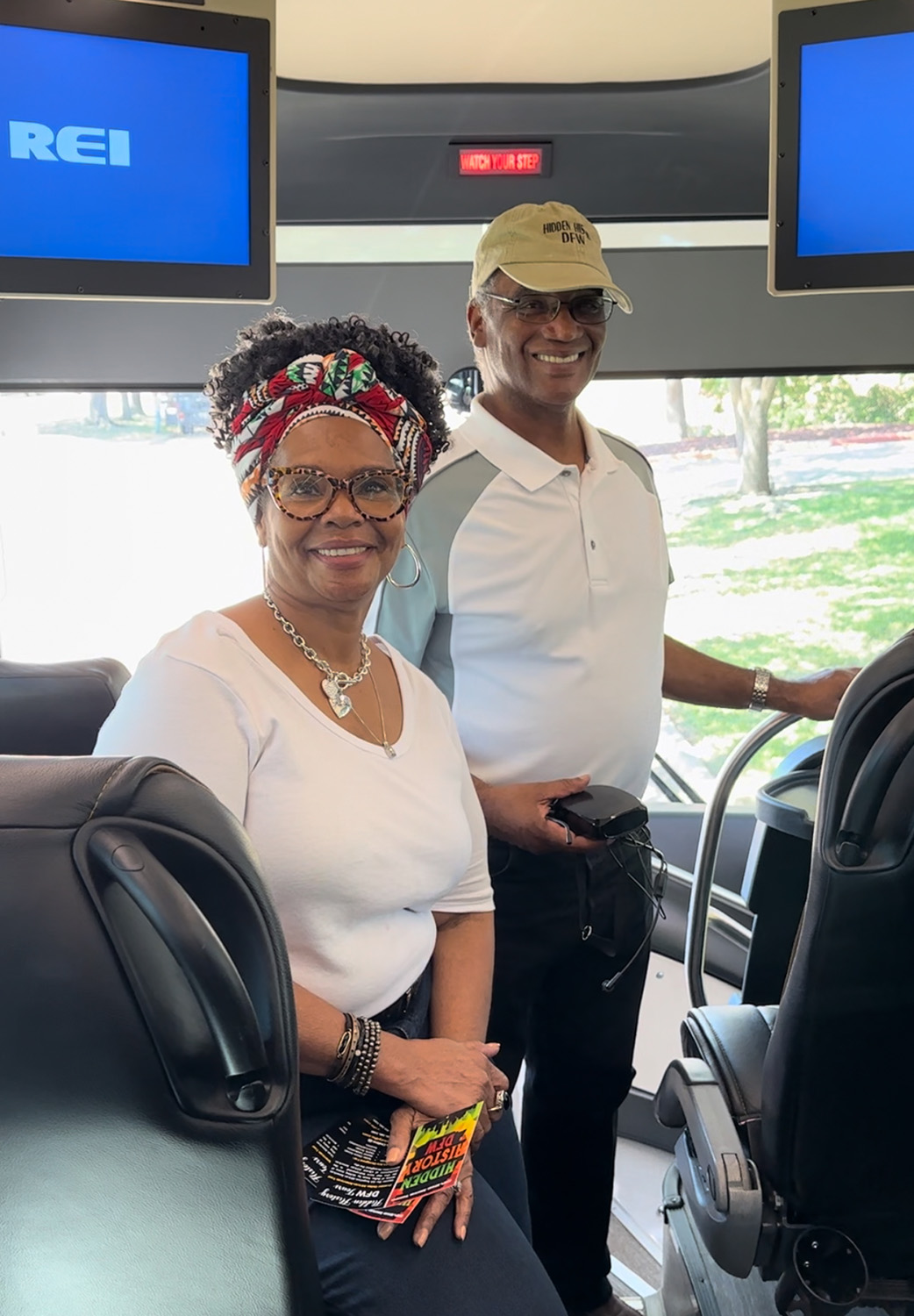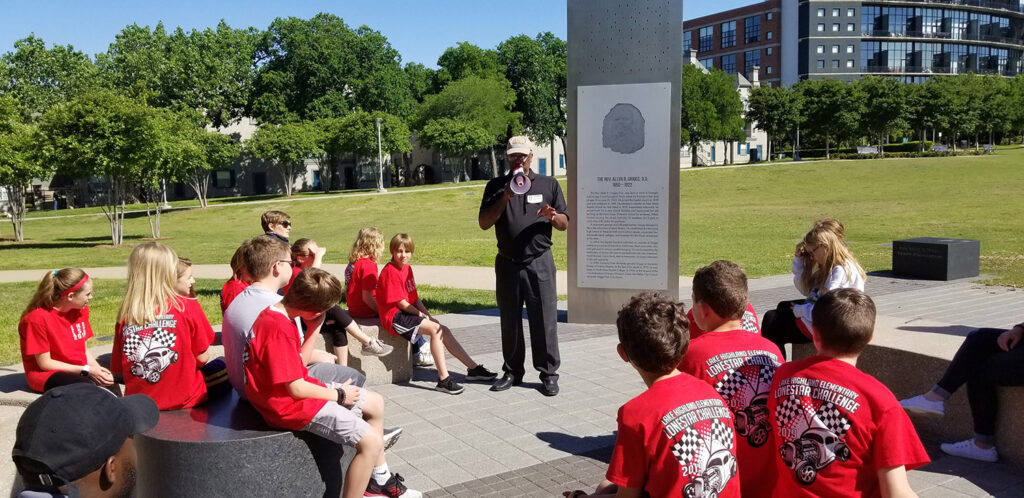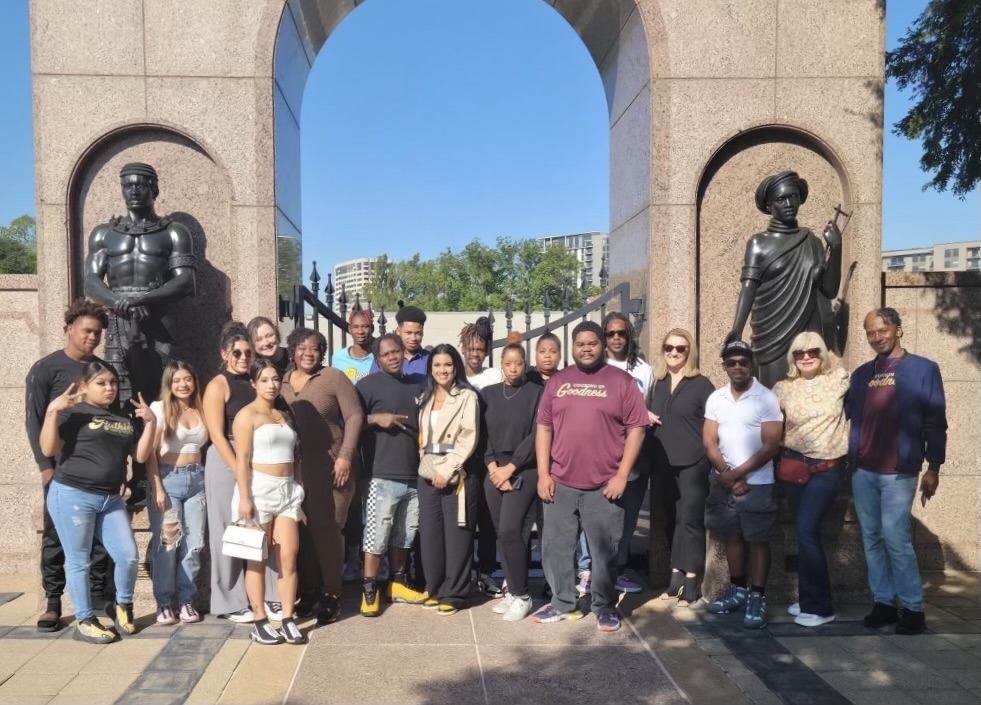Story by Whitney Carter. Video by Jedarrian Jones. Photos provided by Hidden History DFW.
Hidden History DFW was founded in 2018 when Don and Jocelyn realized they could– and should– share the history of the city they love with others. In addition to bi-monthly tours, the company provides films, educational presentations, and apparel celebrating African American history.

“After spending decades visiting other cities and taking historical tours, we decided to develop an African American history tour focusing on Dallas,” the Pinkards say. “It took approximately eight months of background work to create the tour. This background work included extensive research and interviews.”
The Pinkards are rooted in the rich, Black history that Dallas has to offer.
“We were both raised in Dallas,” the Pinkards explain. “Jocelyn was born in Parkland hospital. Don’s paternal grandparents lived in the State Thomas neighborhood and later moved to Oak Cliff. We also both grew up in Oak Cliff and graduated from the first Black high school in Oak Cliff, F. D. Roosevelt.”
Each stop of the tour is meticulously planned. The stops include places the Pinkards say are instrumental in shaping the history of Dallas as we all experience it.
“We start at the J. B. Jackson Dart Center, because Mr. Jackson’s story is essential to understanding the African American experience in the area surrounding Fair Park. He was a successful businessman and activist who fought for Black homeowners threatened with losing their homes in the 1960s,” the Pinkards say.

The other stops include about 40 sites of significance in the Dallas area.
One of the Pinkards’ favorite stops is at the Freedmen’s Cemetery in Uptown, because it memorializes the significance of the State Thomas neighborhood as a freedmen community.
Freedmen’s communities/towns refer to African American communities established by former enslaved people freed after the Civil War. While these towns could be found in many places across the country, Texas saw the bulk of them.
They also make a stop at the African American Museum of Dallas in Fair Park to see their permanent exhibit, “Facing the Rising Sun.” The Pinkards said it also showcases the State Thomas neighborhood, focusing on the people, businesses, and churches.
“We also visit the Moorland Branch YMCA, which is now the home of the Dallas Black Dance Theatre. [When we make that stop] we explain its role in influencing Dallas history,” the Pinkards say.
The Moorland YMCA is the namesake of Dr. Reverend Jesse Edward Moorland, the second secretary of the “Colored Men’s Department of the YMCA” in Washington, D.C. He was known as an educator, minister, and philanthropist, but was most renowned for his extensive work with the Young Men’s Christian Association.

According to their website, where tour tickets can be purchased, the tour also takes participants on a ride back in time, learning about the two largest settlements following the Civil War, the role of American Americans in the formation of what we now call Deep Ellum, and how the Southern Dallas migration changed the city forever.
Those on the tour will also learn about the two largest settlements following the Civil War, African Americans’ role in forming Deep Ellum, and how the Southern Dallas migration changed the face of the city forever.
“We [also] visit Founders Square sharing background information on why so many African Americans came to Dallas in the 1800s. We visit the Juanita Craft House to reveal how instrumental she was in changing Dallas and Texas,” the Pinkards say.
Craft was an activist and politician who fought on the front lines of the Civil Rights Movement. She also served as a member of the Dallas City Council, fighting for African Americans in the area to have the same opportunities as their white counterparts.
Revisiting the original Booker T. Washington High School, which was the only high school for Black people at one point in Dallas, St. Paul United Methodist Church established in 1873 by formerly enslaved people and Tenth Street Historic District are other stops along the way, just to name a few.
The Pinkards hope their efforts are not just noticed by adults, but also by the next generation to continue to carry on the legacy and tell the stories of African Americans in Dallas.
“The tour is for all age groups. It is an excellent opportunity for parents, children, grandparents, and grandchildren of all races to learn local Dallas Black History. The telling of Dallas’s Black history is very important, but we believe it should be integrated with Texas history, American history, and world history. During the tour, we present African American history in the context of a larger historical setting,” the Pinkards explain.
The guided tours can be taken by car or bus, depending on the group tour size, and there is minimal walking required.
The next tour is on Feb. 24, starting at 9:00 am. Pick up and drop off at the J. B. Jackson Dart Center, which can be found at 1423 J. B. Jackson, Jr. Blvd, 75210. Tickets are $47 for adults, $37 for 55 and over children under 18 are $17.
To learn more, get involved, or book your tour, you can do so on the Hidden History DFW website.
Sign up with your email address to receive good stories, events, and volunteer opportunities in your inbox.